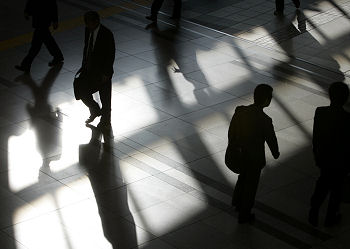The New Republic devoted a cover article to hailing the "conservatism of doubt." For the less bookish, Hollywood spends $130 million on a Crusader epic in which the heroes are 12th century multiculturalists, Christian and Muslim, who want nothing more than love, peace and interfaith understanding. (Such people inhabit 21st century Hollywood, but as columnist John Podhoretz points out, they were nowhere to be seen in 12th century Jerusalem.) And dare you have any "deeply held views" -- a transparent euphemism for religiously grounded views -- especially regarding abortion [or homosexuality or the war against terrorism].
The Op-Ed pages are filled with jeremiads about believers -- principally evangelical Christians and traditional Catholics -- bent on turning the U.S. into a theocracy. Now I am not much of a believer, but there is something deeply wrong -- indeed, deeply un-American -- about fearing people simply because they believe.What nonsense. The campaign against certainty is merely the philosophical veneer for an attempt to politically marginalize and intellectually disenfranchise believers. Instead of arguing the merits of any issue, secularists are trying to win the argument by default on the grounds that the other side displays unhealthy certainty or, even worse, unseemly religiosity. Why this panic about certainty and people who display it? It is not just, as conventional wisdom has it, that liberals think the last election was lost because of a bloc of benighted Evangelicals. It is because we a handful of years of moral certainty, and firm belief -- and that's about all secular liberalism can tolerate.
It seems perfectly O.K. for secularists to impose their secular views on America, such as, say, legalized abortion or gay marriage. But when someone takes the contrary view, all of a sudden he is trying to impose his view on you. And if that contrary view happens to be rooted in Scripture or some kind of religious belief system, the very public advocacy of that view becomes a violation of the U.S. constitutional order.
Do you remember 9/11? How you felt? The moral clarity of that day and the days thereafter? Just days after 9/11, on this very page, Lance Morrow wrote a brilliant, searing affirmation of right against wrong, good against evil. A few years of that near papal certainty is more than any self-respecting intelligentsia can take. The overwhelmingly secular intellectuals are embarrassed that they once nodded in assent to Morrow-like certainty, an affront to their self-flattering pose as skeptics.
Enough. A new day, a new wave. Time again for nuance, doubt and the comforts of relativism. It is not just the restless search for novelty, the artist's Holy Grail. It is weariness with the responsibilities and the nightmares that come with clarity -- and the demands that moral certainty make on us as individuals and as a nation.
Nothing has more aroused and infuriated the sophisticates than the foreign policy of a religiously inclined President, based on the notion of a universal aspiration to freedom and of America's need and duty to advance it around the world. Such liberationism, confident and unapologetic, is portrayed as arrogant crusading, a deep violation of the tradition of American pluralism, ecumenism, modesty and skeptical restraint.That widespread portrayal is invention masquerading as history. You want certainty? You want religiosity? How about a people who overthrow the political order of the ages, go to war and occasion thousands of deaths in the name of self-evident truths and unalienable rights endowed by the Creator? That was 1776. The universality, the sacredness and the divine origin of freedom are enshrined in our founding document. The Founders, believers all, signed it. Thomas Jefferson wrote it. And not even Jefferson, the most skeptical of the lot, had the slightest doubt about it.



1 comment:
Hello
I would have intentional with joy to read what you have written in yours blog, because I love very many the reading.
but I do not know the language. mine blog and Italian, mine linga mother, but you riasca to tradurla write in English hoping that. he does not import if we do not understand the language but to leave a trace in yours and in mine blog poò to help us for being able to us to exchange the auguries in the festivity. Mine blog and only poetries perche oi I love poetries having the poetico mind. If you want some vistarlo I would be happy….what you say? … I waited for to You?
Thanks
Lina
Post a Comment